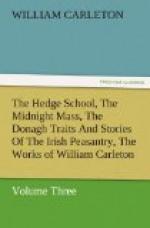This was a specimen of scholastic civilization which Ireland only could furnish; nothing, indeed, could be more perfectly ludicrous than such a chase; and such scenes were by no means uncommon in hedge-schools, for, wherever severe punishment was dreaded—and, in truth, most of the hedge masters were unfeeling tyrants—the boy, if sufficiently grown to make a good race, usually broke away, and fled home at the top of his speed. The pack then were usually led on by the master, who mostly headed them himself, all in full cry, exhibiting such a scene as should be witnessed in order to be enjoyed. The neighbors, men, women, and children, ran out to be spectators; the laborers suspended their work to enjoy it, assembling on such eminences as commanded a full view of the pursuit.
“Bravo, boys—success, masther; lie into him—where’s your huntin’ horn, Mr. Kavanagh?—he’ll bate yez if ye don’t take the wind of him. Well done, Callaghan, keep up yer heart, yer sowl, and you’ll do it asy—you’re gaining’ on them, ma bouchal—the masther’s down, you gallows clip, an’ there’s none but the scholars afther ye—he’s safe.”
“Not he; I’ll hould a naggin, the poor scholar has him; don’t you see, he’s close at his heels?”
“Done, by my song—they’ll never come up wid him; listen to their leather crackers and cord-a-roys, as their knees bang agin one another. Hark forrit, boy’s; hark forrit! huz-zaw, you thieves, huzzaw!”
“Your beagles is well winded, Mr. Kava-nagh, and gives good tongue.”
“Well, masther, you had your chase for nothin’, I see.”
“Mr. Kavanagh,” another would observe, “I didn’t think you war so stiff in the hams, as to let the gorsoon bate you that way—your wind’s failin’, sir.”
The schoolmaster was abroad then, and never was the “march of intellect” at once so rapid and unsuccessful.
During the summer season, it was the usual practice for the scholars to transfer their paper, slates, and books to the green which lay immediately behind the school-house, where they stretched themselves on the grass, and resumed their business. Mat would bring out his chair, and, placing it on the shady side of the hedge, sit with his pipe in his mouth, the contented lord of his little realm, whilst nearly a hundred and fifty scholars, of all sorts and sizes, lay scattered over the grass, basking under the scorching sun in all the luxury of novelty, nakedness, and freedom. The sight was original and characteristic, and such as Lord Brougham would have been delighted with. “The schoolmaster was abroad again.”
As soon as one o’clock drew near, Mat would pull out his Ring-dial* holding it against the sun, and declare the hour.
* The Ring-dial was the hedge-schoolmaster’s next best substitute for a watch. As it is possible that a great number of our readers may never have heard of, much less seen one, we shall in a word or two describe it—nothing could indeed be more simple. It was a bright brass ring, about three-quarters of an inch broad, and two and a half in diameter. There was a small hole in it, which when held opposite the sun admitted the light against the inside of the ring behind. On this was marked the hours and the quarters, and the time was known by observing the number or the quarter on which the slender ray that came in from the hole in front fell.




